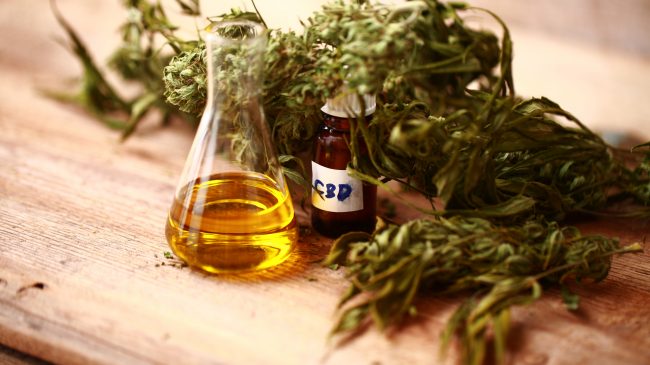There’s a new craze among athletes, dancers, health food consumers, senior citizens and many others—CBD-infused products. Nearly everywhere, from nutritional supplement stores to coffee shops, cannabidiol (CBD) products are flying off the shelves. Retail sales of CBD products reached at least $600 million in the U.S. last year and that figure could grow to $16 billion by 2025, according to market research firm Cowen.
Cannabidiol is one of more than 100 cannabinoids that are naturally produced by the cannabis plant. It is non-psychoactive, unlike tetrahydrocannabinol (THC), the psychoactive chemical in marijuana that gets you high.
The U.S. Food and Drug Administration (FDA) has approved CBD as the primary active pharmaceutical ingredient in Epidiolex, a drug used to reduce the frequency and severity of epileptic seizures in children. Harvard Medical School suggests CBD may be effective for medically managing anxiety, insomnia and chronic pain. Manufacturers are also developing cosmetics, skincare products, beverages and dietary supplements containing CBD.
Nationally, the market for CBD-infused products intensified after the passage of the 2014 U.S. Farm Bill, which allowed states to set up pilot programs to study the cultivation of industrial hemp and the commercial viability of hemp-derived products. With the subsequent 2018 Farm Bill, the federal government also reclassified the cannabinoids derived from hemp grown in compliance with standards set by the U.S. Department of Agriculture under the federal Controlled Substances Act. Whereas cannabinoids had previously been defined as a “resin” of the marijuana plant and therefore a federally banned substance, the reclassification allowed for products containing these hemp-derived cannabinoid extracts to be sold.
An important caveat remains, however. Although the FDA has approved CBD for inclusion in Epidiolex, the child epilepsy medicine, it has not evaluated other claims about the oil. With several manufacturers of CBD products making potential health claims on their packaging or marketing materials, the FDA issued letters to several manufacturers warning consumers that the products “did not contain the levels of CBD they claimed to contain” and that “these products are not approved by FDA for the diagnosis, cure, mitigation, treatment, or prevention of any disease.” In April, then-FDA Commissioner Scott Gottlieb put out a statement saying “it is unlawful to introduce food containing added CBD, or the psychoactive compound THC, into interstate commerce, or to market CBD or THC products as dietary supplements.”
It could take several years before clear FDA guidance on CBD-infused products is adopted and California’s Department of Public Health has chosen to defer to the FDA, stating, “unless the FDA rules that industrial hemp-derived CBD oil and CBD products can be used as a food or California makes a determination that they are safe to use for human and animal consumption, CBD products are not an approved food, food ingredient, food additive, or dietary supplement.” California has issued dozens of violation notices, ordered the destruction of CBD products, and placed injunctions on their sale.
All this has had a chilling effect on the development of a new market, but in May the California Assembly unanimously passed a bill introduced by Assemblywoman Cecilia Aguiar-Curry, D-Winters, that “clarifies that food, drinks, and cosmetics that contain hemp-derived CBD are legal for sale in California.”
Economically and entrepreneurially, California now risks being left behind. As Assemblywoman Aguiar-Curry wrote, “The enforcement actions by state and local regulators severely limits Californians’ access to a product that many consumers believe has substantial benefits for their overall wellness. They are disrupting manufacturers, retailers, and farmers, and are also putting the state’s agricultural industry at a disadvantage in pursuing a national market estimated to reach $20 billion annually in the next few years.”
A large number of Californians are already using CBD oil to help treat pain, anxiety, acne and other issues. The state Senate and Gov. Gavin Newsom should take up the CBD bill to ensure Californians have safe, legal access to these products.

